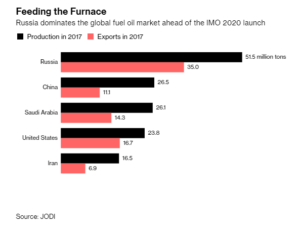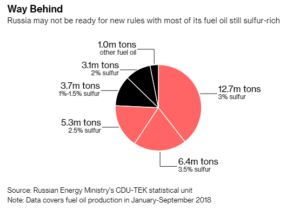From Bloomberg
Russia is set to suffer the biggest revenue losses from rules mandating cleaner marine fuels from 2020, because the world’s top exporter of the sulfurous residual oil that powers ships doesn’t look prepared for the change.
Refineries across the world are bracing themselves for the once-in-a-generation shift intended to reduce pollution caused by ships. While plants in Europe and the U.S. Gulf Coast seem well positioned to make the change to low-sulfur output, Russian companies have done little to prepare.
“Russia’s oil segment appears to end up among the biggest losers financially,” IHS Markit Ltd.’s senior research analyst Alexander Scherbakov said. There’s “no chance for them to be 100 percent prepared” when the new rules kick in, so Russia’s sulfur-rich fuel oil will sell at a widening discount, he said.

In 2020, the lost revenue could amount to $3.5 billion, according to Wood & Co. Financial Services AS, an investment bank focused on emerging Europe. That’s more than a third of the roughly $9 billion in revenue Russian suppliers received from fuel oil exports last year, according to Bloomberg calculations based on Russian customs data.
The regulations prepared by the International Maritime Organization, commonly known as IMO 2020, mean ships must either purchase low-sulfur fuel or install scrubbers that remove the pollutant from their exhaust gases. The rules will cap sulfur content at 0.5 percent, down from 3.5 percent in most regions of the world now. That’s bad news for Russian oil majors that produce and process sulfurous Urals crude.

While the country is on a mission to upgrade its Soviet-era refineries, the nation has focused on raising the production and quality of gasoline and diesel. At the end of September, Russia wasn’t producing any IMO 2020-compliant fuel oil, data from the nation’s Energy Ministry show. More than two-thirds of its output had a sulfur content of 2.5 percent or more.
“Provided the Russian refiners maintain their current output structure and don’t find additional demand domestically,” then they’ll lose sales, said Wood & Co. analyst Ildar Davletshin.
Russia supplied its fuel oil to more than 120 countries last year, from the Netherlands to Fiji. In Europe’s oil-trading and shipping hub of Rotterdam, contracts for supplying fuel oil in December 2019 sell for $19.60 a barrel less than Brent crude. That’s more than three times the discount for November 2018.

The nation’s companies can’t significantly reduce production of high-sulfur fuel oil in time for the new standards, IHS Markit’s Scherbakov said. IMO-focused upgrades at facilities that belong to Rosneft PJSC and Surgutneftegas PJSC are unlikely to be complete before 2020, he said.
Click here for a detailed account of Russian companies’ fuel oil output.
The Energy Ministry declined to comment on the nation’s plans for IMO 2020. Surgutneftegas also declined to comment, while Rosneft didn’t respond to written requests from Bloomberg.
Surgutneftegas’s Kirishi refinery says on its website it plans to continue upgrades of its residue-processing units, without giving a specific date.
Rosneft in its 2017 annual report says deep conversion upgrades at its Tuapse, Novokuibyshevsk, Achinsk and Komsomolsk refineries are a priority for 2018-20. Even though equipment procurement and construction at the facilities are under way, these units can hardly be launched in time for the new rules, according to Scherbakov.
Lukoil PJSC, Russia’s third-largest producer of fuel oil, aims to reduce its output to around 1 million tons a year from some 4 million tons now. This won’t happen until 2021, when a delayed coker unit comes online at the Nizhny Novgorod refinery, the company said in an email.
“There is going to be a big commercial pressure on Russian refineries, whichever scenario you look at,” said Ramin Lakani, an analyst at consultant Muse, Stancil & Co.
Russian refiners do have other options for marketing their high-sulfur fuel oil, none of which would fully offset revenue lost from the shipping market. Here are some of those options:


